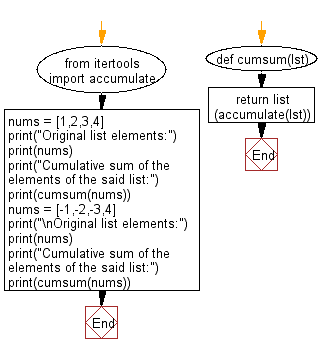Python: Cumulative sum of the elements of a given list
Cumulative Sum of List
Write a Python program to get the cumulative sum of the elements of a given list.
Sample Solution:
Python Code:
# Import the 'accumulate' function from the 'itertools' module.
from itertools import accumulate
# Define a function named 'cumsum' that computes the cumulative sum of a list.
def cumsum(lst):
# Use the 'accumulate' function to calculate the cumulative sum and convert it to a list.
return list(accumulate(lst))
# Create a sample list 'nums' with integer elements.
nums = [1, 2, 3, 4]
# Print the original list elements.
print("Original list elements:")
print(nums)
# Calculate and print the cumulative sum of the elements in the list using the 'cumsum' function.
print("Cumulative sum of the elements of the said list:")
print(cumsum(nums))
# Create another sample list 'nums' with integer elements, including negative values.
nums = [-1, -2, -3, 4]
# Print the original list elements.
print("\nOriginal list elements:")
print(nums)
# Calculate and print the cumulative sum of the elements in the list using the 'cumsum' function.
print("Cumulative sum of the elements of the said list:")
print(cumsum(nums))
Sample Output:
Original list elements: [1, 2, 3, 4] Cumulative sum of the elements of the said list: [1, 3, 6, 10] Original list elements: [-1, -2, -3, 4] Cumulative sum of the elements of the said list: [-1, -3, -6, -2]
Flowchart:

For more Practice: Solve these Related Problems:
- Write a Python program to compute the cumulative product of the elements in a list.
- Write a Python program to calculate the cumulative sum and then return the differences between successive cumulative totals.
- Write a Python program to find the maximum cumulative sum reached when iterating through a list of mixed numbers.
- Write a Python program to compute the cumulative sum of a list recursively.
Go to:
Previous: Write a Python program to cast the provided value as a list if it's not one.
Next: Write a Python program to get a list with n elements removed from the left, right.
Python Code Editor:
What is the difficulty level of this exercise?
Test your Programming skills with w3resource's quiz.
